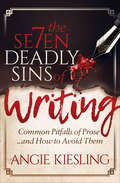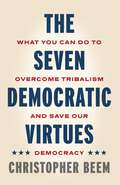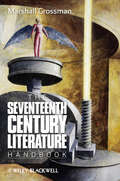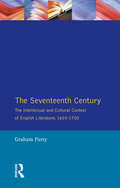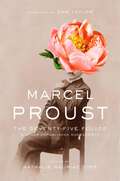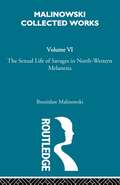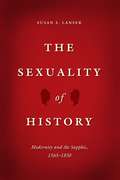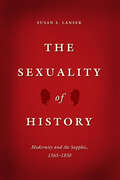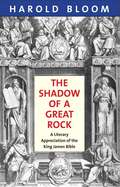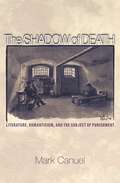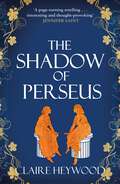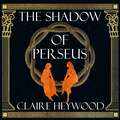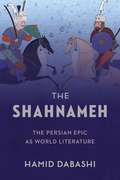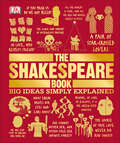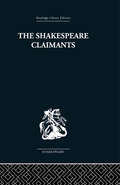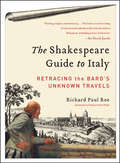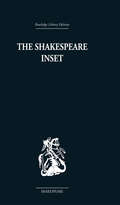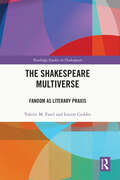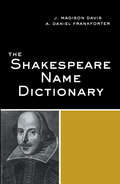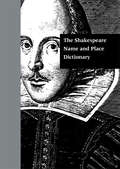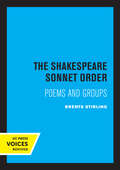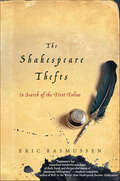- Table View
- List View
The Seven Deadly Sins of Writing: Common Pitfalls of Prose . . . and How to Avoid Them
by Angie KieslingA book editor with decades of publishing experience shows writers how to avoid mistakes in this quick, whimsical guide. This concise guidebook borrows the idea of the Seven Deadly Sins from the Middle Ages and applies it to the craft of writing—revealing seven &“Deadly Don&’ts&” that the author, a veteran book editor, has encountered time and time again in writers&’ work. In addition to showing you how to avoid those all-too-common mistakes, she provides a &“Divine Do&” for each, offering useful take-aways writers can use to communicate more clearly and effectively, whether they&’re working on a masterpiece-in-progress or just want to sharpen their everyday writing skills.
The Seven Democratic Virtues: What You Can Do to Overcome Tribalism and Save Our Democracy
by Christopher BeemThe insurrection of January 6, 2021, demonstrated conclusively that tribalism in the United States has become dangerous. The “other side” is no longer viewed as a well-intentioned opponent but as an existential threat. If we don’t change course, American democracy is far from assured.This book outlines specific steps that average citizens can take to back the nation away from the brink. Instead of looking to political leaders, institutions, or policy for solutions to extreme partisanship, Christopher Beem argues that concerned citizens can and must take up the cause. He spells out seven civic practices we can all follow that will help us work against our antidemocratic tendencies and reorient the nation toward the “more perfect union” of our Founders. Beem’s road map to restore our democracy draws on thinkers from Aristotle and Thomas Aquinas to James Madison, Hannah Arendt, Abraham Lincoln, and Franklin Delano Roosevelt. Empathetic and eminently reasonable, The Seven Democratic Virtues presents practical advice for what each of us can do to change the political discourse and save our democracy. This is necessary reading for our politics today—and in the future.
The Seventeenth - Century Literature Handbook (Wiley Blackwell Literature Handbooks #18)
by Marshall GrossmanThe Seventeenth Century Handbook provides the undergraduate with a succinct account of the century’s events, along with an exploration of the ways the literature reflected and helped shape the history of the time. Provides a coherent narrative of the entire century of literary history as well as an easy-to-use guide to the principal literary works and figures Offers an exploration of the ways the literature reflected and helped shape the history of the time Describes the continuities as well as the radical changes in this century of civil war and reformation Combines a central narrative account of “texts and contexts” with a selection of brief essays on key texts and topics Includes an alphabetical selection of capsule descriptions of important writers
The Seventeenth Century: The Intellectual and Cultural Context of English Literature, 1603-1700 (Longman Literature In English Series)
by Graham ParryThe seventeenth century was a period of immense turmoil. This book explores the methods by which a distinctive iconography was created for each Stuart king, describes the cultural life of the Civil War period and the Cromwellian Protectorate, and analyses the impact of the antiquarian movement which constructed a new sense of national identity. Through this detailed and fascinating discussion of seventeenth-century society, Graham Parry provides a clear insight into the many forces operating on the literature of the period.
The Seventy-Five Folios and Other Unpublished Manuscripts
by Marcel ProustPresented for the first time in English, the recently discovered early manuscripts of the twentieth century’s most towering literary figure offer uncanny glimpses of his emerging genius and the creation of his masterpiece.One of the most significant literary events of the century, the discovery of manuscript pages containing early drafts of Marcel Proust’s In Search of Lost Time put an end to a decades-long search for the Proustian grail. The Paris publisher Bernard de Fallois claimed to have viewed the folios, but doubts about their existence emerged when none appeared in the Proust manuscripts bequeathed to the Bibliothèque Nationale in 1962. The texts had in fact been hidden among Fallois’s private papers, where they were found upon his death in 2018. The Seventy-Five Folios and Other Unpublished Manuscripts presents these folios here for the first time in English, along with seventeen other brief unpublished texts. Extensive commentary and notes by the Proust scholar Nathalie Mauriac Dyer offer insightful critical analysis.Characterized by Fallois as the “precious guide” to understanding Proust’s masterpiece, the folios contain early versions of six episodes included in the novel. Readers glimpse what Proust’s biographer Jean-Yves Tadié describes as the “sacred moment” when the great work burst forth for the first time. The folios reveal the autobiographical extent of Proust’s writing, with traces of his family life scattered throughout. Before the existence of Charles Swann, for example, we find a narrator named Marcel, a testament to what one scholar has called “the gradual transformation of lived experience into (auto)fiction in Proust’s elaboration of the novel.”Like a painter’s sketches and a composer’s holographs, Proust’s folios tell a story of artistic evolution. A “dream of a book, a book of a dream,” Fallois called them. Here is a literary magnum opus finding its final form.
The Severed Head and the Grafted Tongue
by Patricia PalmerSevered heads emblemise the vexed relationship between the aesthetic and the atrocious. During the Elizabethan conquest of Ireland, colonisers such as Edmund Spenser, Sir John Harington and Sir George Carew wrote or translated epic romances replete with beheadings even as they countenanced - or conducted - similar deeds on the battlefield. This study juxtaposes the archival record of actual violence with literary depictions of decapitation to explore how violence gets transcribed into art. Patricia Palmer brings the colonial world of Renaissance England face-to-face with Irish literary culture. She surveys a broad linguistic and geographical range of texts, from translations of Virgil's Aeneid to the Renaissance epics of Ariosto and Ercilla and makes Irish-language responses to conquest and colonization available in readable translations. In doing so, she offers literary and political historians access not only to colonial brutality but also to its ethical reservations, while providing access to the all-too-rarely heard voices of the dispossessed.
The Sexual Lives of Savages: [1932/1952] (Bronislaw Malinowski Ser.)
by MalinowskiThis volume provides an ethnographic account of courtship, marriage and family life among the people of the Trobriand Islands.
The Sexuality of History: Modernity and the Sapphic, 1565-1830
by Susan S. LanserThe period of reform, revolution, and reaction that characterized seventeenth- and eighteenth-century Europe also witnessed an intensified interest in lesbians. In scientific treatises and orientalist travelogues, in French court gossip and Dutch court records, in passionate verse, in the rising novel, and in cross-dressed flirtations on the English and Spanish stage, poets, playwrights, philosophers, and physicians were placing sapphic relations before the public eye. In The Sexuality of History, Susan S. Lanser shows how intimacies between women became harbingers of the modern, bringing the sapphic into the mainstream of some of the most significant events in Western Europe. Ideas about female same-sex relations became a focal point for intellectual and cultural contests between authority and liberty, power and difference, desire and duty, mobility and change, order and governance. Lanser explores the ways in which a historically specific interest in lesbians intersected with, and stimulated, systemic concerns that would seem to have little to do with sexuality. Departing from the prevailing trend of queer reading whereby scholars ferret out hidden content in "closeted” texts, Lanser situates overtly erotic representations within wider spheres of interest. The Sexuality of History shows that just as we can understand sexuality by studying the past, so too can we understand the past by studying sexuality.
The Sexuality of History: Modernity and the Sapphic, 1565–1830
by Susan S. LanserThe period of reform, revolution, and reaction that characterized seventeenth- and eighteenth-century Europe also witnessed an intensified interest in lesbians. In scientific treatises and orientalist travelogues, in French court gossip and Dutch court records, in passionate verse, in the rising novel, and in cross-dressed flirtations on the English and Spanish stage, poets, playwrights, philosophers, and physicians were placing sapphic relations before the public eye. In The Sexuality of History, Susan S. Lanser shows how intimacies between women became harbingers of the modern, bringing the sapphic into the mainstream of some of the most significant events in Western Europe. Ideas about female same-sex relations became a focal point for intellectual and cultural contests between authority and liberty, power and difference, desire and duty, mobility and change, order and governance. Lanser explores the ways in which a historically specific interest in lesbians intersected with, and stimulated, systemic concerns that would seem to have little to do with sexuality. Departing from the prevailing trend of queer reading whereby scholars ferret out hidden content in “closeted” texts, Lanser situates overtly erotic representations within wider spheres of interest. The Sexuality of History shows that just as we can understand sexuality by studying the past, so too can we understand the past by studying sexuality.
The Shadow Negotiation: How Women Can Master the Hidden Agendas That Determine Bargaining Success
by Deborah M. Kolb Judith WilliamsWomen have to negotiate not harder, but smarter.
The Shadow of A Great Rock: A Literary Appreciation of the King James Bible
by Harold BloomThe King James Bible stands at "the sublime summit of literature in English," sharing the honor only with Shakespeare, Harold Bloom contends in the opening pages of this illuminating literary tour. Distilling the insights acquired from a significant portion of his career as a brilliant critic and teacher, he offers readers at last the book he has been writing "all my long life," a magisterial and intimately perceptive reading of the King James Bible as a literary masterpiece. Bloom calls it an "inexplicable wonder" that a rather undistinguished group of writers could bring forth such a magnificent work of literature, and he credits William Tyndale as their fountainhead. Reading the King James Bible alongside Tyndale's Bible, the Geneva Bible, and the original Hebrew and Greek texts, Bloom highlights how the translators and editors improved upon--or, in some cases, diminished--the earlier versions. He invites readers to hear the baroque inventiveness in such sublime books as the Song of Songs, Ecclesiastes, and Job, and alerts us to the echoes of the King James Bible in works from the Romantic period to the present day. Throughout, Bloom makes an impassioned and convincing case for reading the King James Bible as literature, free from dogma and with an appreciation of its enduring aesthetic value.
The Shadow of Death: Literature, Romanticism, and the Subject of Punishment
by Mark CanuelThe Shadow of Death is a timely and ambitious reassessment of English Romantic literature and the unique role it played in one of the great liberal political causes of the modern age. Mark Canuel argues that Romantic writers in Great Britain led one of the earliest assaults on the death penalty and were instrumental in bringing about penal-law reforms. He demonstrates how writers like Percy Bysshe Shelley, Lord Byron, William Wordsworth, and Jane Austen defined the fundamental contradictions that continue to inform today's debates about capital punishment. Celebrated reformers like Sir Samuel Romilly and William Ewart campaigned against the widespread use of death to punish crimes ranging from murder to petty theft, but they were most influential for initiating a system of penalties built upon conflicting motivations and justifications. Canuel examines the ways Romantic poets and novelists magnified these tensions while treating them as uniquely aesthetic opportunities, seized upon contending rationales of punishment to express imaginative power, and revealed how the imagination fueled the new penal code's disturbing vitality. Death-penalty reform, Canuel argues, in fact emerged from a new way of thinking about punishment as a negotiation among rationales rather than a seamless whole, with leniency and severity constantly at odds. He concludes by exploring how Romantic penal reform continues to influence contemporary views about the justice--and injustice--of legal sanctions.
The Shadow of Perseus
by Claire HeywoodHistory remembers him as a hero. But the women who knew him best remember a different man...Perseus grows up wanting to be a hero, but he cannot become one if his mother Danae still sees him as a boy. When his stepfather Polydektes casts him away on a voyage across the sea, Perseus is determined to fulfil the great destiny of the son of a god and the grandson of a king. But the line between heroism and monstrosity is thin, and when Perseus attempts to seduce first gentle Medusa and then beautiful Andromeda, before finally reuniting with Danae, they each learn of the dangers of resisting a boy prepared to risk it all for greatness . . .
The Shadow of Perseus: A compelling feminist retelling of the myth of Perseus told from the perspectives of the women who knew him best
by Claire HeywoodThe myth of Perseus, told through the story of the three women who knew him best - his mother Danae, his wife Andromeda, and his victim, Medusa.History remembers him as a hero. But the women who knew him best remember a different man...Perseus grows up wanting to be a hero, but he cannot become one if his mother Danae still sees him as a boy. When his stepfather Polydektes casts him away on a voyage across the sea, Perseus is determined to fulfil the great destiny of the son of a god and the grandson of a king. But the line between heroism and monstrosity is thin, and when Perseus attempts to seduce first gentle Medusa and then beautiful Andromeda, before finally reuniting with Danae, they each learn of the dangers of resisting a boy prepared to risk it all for greatness . . .(p) 2023 Hodder & Stoughton Limited
The Shadows of Poetry: Vergil in the Mind of Augustine (Transformation of the Classical Heritage #26)
by Sabine MacCormackImperial ceremony was a vital form of self-expression for late antique society. Sabine MacCormack examines the ceremonies of imperial arrivals, funerals, and coronations from the late third to the late sixth centuries A.D., as manifest in the official literature and art of the time. Her study offers us new insights into the exercise of power and into the social, political, and cultural significance of religious change during the Christianization of the Roman world.
The Shahnameh: The Persian Epic as World Literature
by Hamid DabashiThe Shahnameh, an epic poem recounting the foundation of Iran across mythical, heroic, and historical ages, is the beating heart of Persian literature and culture. Composed by Abu al-Qasem Ferdowsi over a thirty-year period and completed in the year 1010, the epic has entertained generations of readers and profoundly shaped Persian culture, society, and politics. For a millennium, Iranian and Persian-speaking people around the globe have read, memorized, discussed, performed, adapted, and loved the poem.In this book, Hamid Dabashi brings the Shahnameh to renewed global attention, encapsulating a lifetime of learning and teaching the Persian epic for a new generation of readers. Dabashi insightfully traces the epic’s history, authorship, poetic significance, complicated legacy of political uses and abuses, and enduring significance in colonial and postcolonial contexts. In addition to explaining and celebrating what makes the Shahnameh such a distinctive literary work, he also considers the poem in the context of other epics, such as the Aeneid and the Odyssey, and critical debates about the concept of world literature. Arguing that Ferdowsi’s epic and its reception broached this idea long before nineteenth-century Western literary criticism, Dabashi makes a powerful case that we need to rethink the very notion of “world literature” in light of his reading of the Persian epic.
The Shakespeare Book: Big Ideas Simply Explained (DK Big Ideas)
by DKLearn the entire works of one of the greatest writers of the English language in The Shakespeare Book.Part of the fascinating Big Ideas series, this book tackles tricky topics and themes in a simple and easy to follow format. Learn about the works of William Shakespeare in this overview guide, great for beginners looking to learn and experts wishing to refresh their knowledge alike! The Shakespeare Book brings a fresh and vibrant take on the topic through eye-catching graphics and diagrams to immerse yourself in. This captivating book will broaden your understanding of Shakespeare, with:- Every play and poem from Shakespeare&’s canon, including lost plays and less well-known works of poetry- Packed with facts, charts, timelines and graphs to help explain core concepts- A visual approach to big subjects with striking illustrations and graphics throughout- Easy to follow text makes topics accessible for people at any level of understandingThe Shakespeare Book is the perfect introduction to the entire canon of Shakespeare&’s plays, sonnets, and other poetry, aimed at adults with an interest in the subject and students wanting to gain more of an overview. Here you&’ll discover the complete works, from The Comedy of Errors, to the great tragedies of Hamlet, Othello, King Lear, and Macbeth.Your Shakespeare Questions, Simply ExplainedThis is a brilliant, innovative exploration of the entire canon of Shakespeare plays, sonnets, and other poetry with detailed plot summaries and a full analysis of the major characters and themes. If you thought it was difficult to learn about the works of one of the greatest writers in the English language, The Shakespeare Book presents key information in a simple layout. Every work is covered, from the comedies of Twelfth Night and As You Like It to the tragedies of Julius Caesar and Hamlet, with easy-to-understand graphics and illustrations bringing the themes, plots, characters, and language of Shakespeare to life.The Big Ideas SeriesWith millions of copies sold worldwide, The Shakespeare Book is part of the award-winning Big Ideas series from DK. The series uses striking graphics along with engaging writing, making big topics easy to understand.
The Shakespeare Claimants: A Critical Survey of the Four Principal Theories concerning the Authorship of the Shakespearean Plays
by H. N GibsonThis edition first published in 1962. The Shakespeare Claimants is a critical survey of the great controversy that has raged over the authorship of the Shakespearean plays. It provides the general reader with an outline history of this controversy and with a full description and analysis of the main anti-Stratfordian arguments. This book concentrates on the four main claimants: Bacon, Oxford, Derby and Marlowe. The book contains an extensive bibliography and footnotes to guide the reader through the text.
The Shakespeare Guide to Italy
by Richard Paul RoeRichard Paul Roe spent more than twenty years traveling the length and breadth of Italy on a literary quest of unparalleled significance. Using the text from Shakespeare's ten "Italian Plays" as his only compass, Roe determined the exact locations of nearly every scene in Romeo and Juliet, The Two Gentlemen of Verona, The Merchant of Venice, Much Ado about Nothing, The Tempest, and the remaining dramas set in Italy. His chronicle of travel, analysis, and discovery paints with unprecedented clarity a picture of what the Bard must have experienced before penning his plays. Equal parts literary detective story and vivid travelogue-containing copious annotations and more than 150 maps, photographs, and paintings-The Shakespeare Guide to Italy is a unique, compelling, and deeply provocative journey that will forever change our understanding of how to read the Bard . . . and irrevocably alter our vision of who William Shakespeare really was.
The Shakespeare Inset: Word and Picture
by Francis BerryWhat is the relation between the language being heard and the picture being simultaneously exhibited on the stage? Typically there is an identity between sound and sight, but often there is a divergence between what the audience hears and what is sees. These divergences are 'insets' and examines the motives, mechanics and poetic qualities of these narrative poems embedded in the plays.
The Shakespeare Multiverse: Fandom as Literary Praxis (Routledge Studies in Shakespeare #1)
by Valerie M. Fazel Louise GeddesThe Shakespeare Multiverse: Fandom as Literary Praxis argues that fandom offers new models for a twenty-first century reading practice that embraces affective pleasure and subjective self-positioning as a means of understanding a text. Part critical study, part source book, The Shakespeare Multiverse suggests that fannish contributions to the ongoing expansion of the object that we call Shakespeare is best imagined as a multiverse, encompassing different worlds that consolidate the various perspectives that different fans bring to Shakespeare. Our concept of the multiverse redefines ‘Shakespeare’ not as a singular body of work, but as space where a process of inquiry and cultural memory – memories in the making, and those already made – is influenced and shaped by the technologies available to the reader. Characteristic of fandom is an intertextual reading strategy that we term cyborg reading, an approach that accommodates the varied elements of identity, politics, culture, sexuality, and race that shape the ways that Shakespeare is explored and appropriated throughout fannish reading communities. The Shakespeare Multiverse intersects literary theory, fan studies, and popular culture as it traverses Shakespeare fandom from the 1623 Folio to the age of the Internet, exploring the different textures of fan affect, from those who firmly uphold fidelity to the text to those who sit on the very edge of the fandom, threatening to cross over into Shakespearean anti-fandom. By recognizing the literary value of fandom, The Shakespeare Multiverse offers a new approach to literary criticism that challenges the limits of hegemonic authority and recognizes the value of a joyfully speculative critical praxis.
The Shakespeare Name Dictionary
by J. Madison Davis Daniel A. FrankforterEntries provide the likely sources for a name; describe historical and mythological backgrounds; examine Shakespeare's presentation of a character or place; and suggest various interpretations of a name. Each entry contains line citations to William Shakespeare: The Complete Works. A guide to the historical, mythological, fictional, and geographic references that appear in Shakespeare's complete plays and poems, covering every name, proper adjective, official title, literary and mystical title, and place name.
The Shakespeare Name and Place Dictionary
by A. Daniel Frankforter J. Madison DavisEntries provide the likely sources for a name; describe historical and mythological backgrounds; examine Shakespeare's presentation of a character or place; and suggest various interpretations of a name. Each entry contains line citations to William Shakespeare: The Complete Works, edited by Wells and Taylor, Oxford University Press, 1986.
The Shakespeare Sonnet Order: Poems and Groups
by Brents StirlingThis title is part of UC Press's Voices Revived program, which commemorates University of California Press’s mission to seek out and cultivate the brightest minds and give them voice, reach, and impact. Drawing on a backlist dating to 1893, Voices Revived makes high-quality, peer-reviewed scholarship accessible once again using print-on-demand technology. This title was originally published in 1968.
The Shakespeare Thefts: In Search of the First Folios
by Eric RasmussenPart literary detective story, part Shakespearean lore, The Shakespeare Thefts will charm the Bard's many fans.The first edition of Shakespeare's collected works, the First Folio, published in 1623, is one of the most valuable books in the world and has historically proven to be an attractive target for thieves. Of the 160 First Folios listed in a census of 1902, 14 were subsequently stolen-and only two of these were ever recovered. In his efforts to catalog all these precious First Folios, renowned Shakespeare scholar Eric Rasmussen embarked on a riveting journey around the globe, involving run-ins with heavily tattooed criminal street gangs in Tokyo, bizarre visits with eccentric, reclusive billionaires, and intense battles of wills with secretive librarians. He explores the intrigue surrounding the Earl of Pembroke, arguably Shakespeare's boyfriend, to whom the First Folio is dedicated and whose personal copy is still missing. He investigates the uncanny sequence of events in which a wealthy East Coast couple drowned in a boating accident and the next week their First Folio appeared for sale in Kansas. We hear about Folios that were censored, the pages ripped out of them, about a volume that was marked in red paint-or is it blood?-on every page; and of yet another that has a bullet lodged in its pages.
